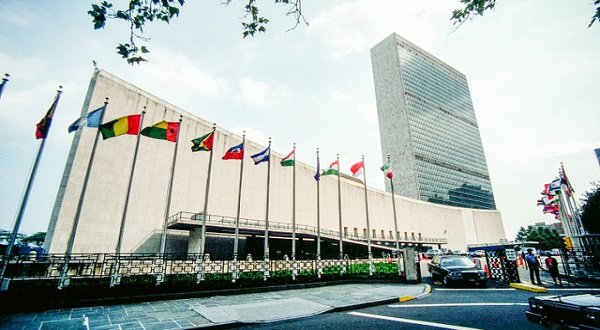
The diplomats were urged to pose tough questions to India at the Universal Periodic Review (UPR) in November.
Press Release
GENEVA – Last month, a minority rights coalition urged United Nations agencies and officials, as well as dozens of Western countries in Geneva, not to pull punches in asking India tough questions at the 41st session of Universal Periodic Review (UPR) of India’s human rights scheduled in November.
The coalition was consisted of a delegation of the Indian American Muslim Council (IAMC) and Hindus for Human Rights (HfHR).
Under the aegis of the United Nations Human Rights Council (UNHRC), the UPR process allows a review of the human rights situation in all 193 UN member states once every five years.
IAMC’s Safa Ahmed and HfHR’s Ria Chakrabarty met with United Nations staffers and country representatives at the UN Office in Geneva to highlight India’s egregious violations of human rights and religious freedom under Prime Minister Narendra Modi-led Bharatiya Janata Party (BJP) government.
Along with the coalition partners from the US, India, and Europe, Ahmed and Chakrabarty met with representatives of the United Kingdom, Canada, Ireland, Italy, Poland, Denmark, and the Czech Republic, as well as staffers of the United Nations Special Rapporteur on Minority Issues and the Special Rapporteur on the Independence of Judges and Lawyers.
They also met with Human Rights Officers from the Office of the Commissioner for Human Rights (OHCHR), including the Special Procedures Branch, the Civic Space Unit, and an OHCHR Asia Specialist.
In each of these meetings, the delegation stressed the gravity of the situation religious minorities in India, particularly Muslims are finding themselves in. They highlighted the exponential rise in anti-Muslim hate speech and violence, cow-related lynchings of Muslims, the passage of laws that discriminate against Muslims and Christians, threats of sexual violence against Muslim women along with dozens of explicit calls for genocide of Muslims by Hindu supremacist leaders since December 2021.
“In the past two years alone, we’ve seen Hindu extremists openly pitch for genocidal massacres of Muslim citizens, bulldozing of Muslim-owned homes, businesses, and places of worship, and rampant arrest of Muslims under draconian terror laws for expressing dissent,” said Ahmed.
“Now more than ever, the international community must realise that India is headed towards a dangerous path. They must put pressure on the Indian government to extend protections to its 200 million Muslims who are at the cusp of genocide. We have called on the country representatives to put special emphasis on preventing mass violence against Muslims,” Ahmed added.
“At HfHR, our goal is to be in lockstep with Indian activists and absorb the dangers that they or people from minority communities face. Our diaspora and international groups are advocating for the same policy recommendations that Indian human rights defenders have proposed, even as we all speak to a wide variety of human rights issues in India,” said Chakrabarty.
“We’ve encouraged missions to highlight the undermining of human rights by the Indian government and that over the past five years, things have only gotten worse,” she added.
Along with its coalition partners World Evangelical Alliance, Open Doors International, Hindus for Human Rights, Justice for All, and International Commission for Dalit Rights, IAMC has recommended that countries call upon Indian state officials to publicly condemn the Hindu supremacist ideology and violence against religious minorities, ensure independent investigation and prosecution in all cases of state violence against minorities, and amend draconian and discriminatory legislations, including the Citizenship Amendment Act (CAA) and the Unlawful Activities Prevention Act (UAPA), to comply with international human rights standards.
“India’s last UPR was in 2017, and in the past five years, human rights conditions for Muslims, Christians, Dalits, and other minorities have worsened severely due to the rise of Hindu extremism under the BJP,” said Syed Afzal Ali, President of IAMC. “IAMC calls upon the international community to prevent the situation from deteriorating even further by holding India accountable in the UPR’s public forum.”
In the lead-up to the UPR cycle, IAMC will continue to engage with coalition partners and allies in Geneva and the United States.